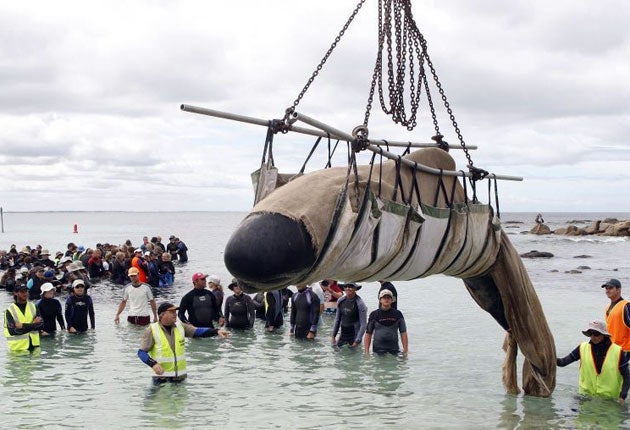Beached whales must be killed, say marine experts
Rescue attempts to refloat animals 'causes unnecessary suffering and rarely works'

Stranded whales on British beaches will be killed by lethal injection rather than being made to suffer as a result of doomed attempts to refloat them into the safety of deep water, marine experts said yesterday. Attempts to refloat stranded whales will be made only in exceptional circumstances, where there is a high chance of success. Research has shown that most beached whales in Britain have fatal damage to their internal organs.
The new policy will apply only to species such as the sperm, beaked and northern bottlenose whales, which normally live and feed in deep water. Dolphins and porpoises, which tend to be involved in "mass strandings", will not be put down unless they are found to be seriously ill, the experts said.
The new policy has the support of the Royal Society for the Protection of Animals (RSPCA) and the Marine Animals Rescue Coalition, which unanimously agreed to the decision after hearing evidence from scientists involved in a study of dozens of stranded whales over a four-year period.
Between 2002 and 2006, 30 sperm whales and 24 beaked whales were recorded as stranded on British beaches. None survived and blood tests showed they had kidney failure brought on by severe dehydration and damage to their internal organs caused by the pressure of their own weight, unsupported by water. One of the most famous cases of a stranded whale that died during a rescue attempt was the female northern bottlenose whale that swam up the river Thames as far as Battersea during January 2006. The six-tonne creature died from dehydration and exhaustion soon after being loaded on to a rescue barge.
Tests by Paul Jepson, an expert on whales and dolphins at the Zoological Society of London, found that the whale's renal failure was caused by the release of an oxygen-carrying muscle protein called myoglobin that had seeped into the blood from the damaged tissues of its crushed muscles. Tests on other whales came to similar conclusions.
"It's only recently that we've actually got blood samples from these larger whales," Dr Jepson said. "The Thames whale was one of the first ones. All the blood samples we've taken have shown the same picture of dehydration, kidney damage and severe muscle damage. Every stranded whale should ideally have a vet in assistance. We have a choice either to refloat them as quickly as possible or euthanise them by lethal injection, and that, usually, is the best decision.
"We really don't have any evidence to the contrary. We don't have a single case of an apparent success that we can point to, so the evidence [in favour of euthanasia] is very compelling." Adam Grogan, a senior scientific officer at the RSPCA, said that whales are used to living in deep water where they feed on squid and other food items, their only source of drinking water. Even if refloated, it is highly unlikely that beached whales would be able to swim back to their normal habitat.
"The findings show that when these whales are outside of their normal range, they become dehydrated as a result of not being able to feed, and quickly begin to deteriorate," Dr Grogan said. "They then become stranded, which damages their muscles and leads eventually to kidney failure."
The scientists believe stranded whales with renal failure are suffering pain and that the most humane way of dealing with them is to inject them with a powerful opioid drug rather than prolonging their misery with attempts to refloat them back into the sea.
"If I had a dog or a cat with this kind of kidney picture on the results we had then I'd think that the animal would be feeling pretty awful," Dr Jepson said. "Added to that is the stress of being stranded and dehydrated; these animals are suffering."
Subscribe to Independent Premium to bookmark this article
Want to bookmark your favourite articles and stories to read or reference later? Start your Independent Premium subscription today.

Join our commenting forum
Join thought-provoking conversations, follow other Independent readers and see their replies